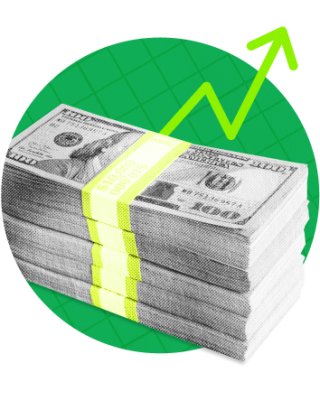Many or all of the products featured here are from our partners who compensate us. This influences which products we write about and where and how the product appears on a page. However, this does not influence our evaluations. Our opinions are our own. Here is a list of our partners and here's how we make money.
2.0
NerdWallet ratingat ACE Cash Express
The ACE Elite prepaid debit card may cost more than it’s worth. The card, managed by NetSpend and issued by MetaBank, has a few extra services that aren’t on many other prepaid cards, such as an interest-bearing savings account, but the card fees add up. If you have direct deposit, you can cut down on some costs. But there are more affordable prepaid debit cards.
Read on for more details about the ACE Elite’s fees and services.
Best for:
Those who can’t open a bank account, want to receive direct deposits and can take advantage of the savings feature.
Pros
Free to get the card online. And the sign-up process is straightforward. You need your Social Security number when you sign up, but there’s no credit check.
Discount on monthly fee. If you have at least $500 in direct deposits monthly (from payroll or government benefits), you can be part of the $5 FeeAdvantage Plan that costs $60 a year.
Up to two days faster for direct deposit. Companies and government agencies may send your money earlier than the official payday, but banks usually wait to process funds. ACE Elite can process direct deposits faster, but it depends on whether they receive your money early.
Monthly plans don’t have purchase fees. Most prepaid debit cards don’t charge fees for using the plastic at stores, but ACE Elite’s pay-as-you-go plan does -- $1 per purchase. The card’s two monthly plans, however, keep purchases free.
Three free reload options. Direct deposits, online transfers from another ACE Elite card and mobile check deposits with 10-day processing are available with no fee. Transfers from bank accounts may be free, but it depends on the bank.
Has savings account with 5% APY for first $1,000. This annual percentage yield is high, but after the first $1,000, the rate drops to 0.50% APY for the remaining balance. This means you can earn $50 in interest for your first $1,000, then $5 for your next $1,000, and the same for the next. If you pay a year’s worth of monthly fees, though, that cost alone might outweigh whatever you make in interest.
» See more options: Check our list of best prepaid debit cards
Cons
High monthly fee. Prepaid debit cards tend to have a monthly fee around $5, on average, but ACE Elite’s fee is $9.95.
Other fees. If you stop using the ACE Elite card for 90 days or request a check for a remaining card balance, there’s a $5.95 fee. There's also a fee to buy the card in stores, up to $9.95; a $1 fee for declined transactions; and fees for some calls to customer service.
No free-withdrawal network for any customers. To withdraw cash at any ATM or over the counter at a bank costs $2.50 each time.
Has optional overdraft program. A big selling point for many prepaid debit cards is not having overdraft fees if your account dips into the negative. ACE Elite, like other NetSpend-managed cards, has an overdraft program with $15 overdraft fees and a maximum of three per month. This is cheaper than most banks’ overdraft programs but not ideal to use if you need help budgeting.
No free way to add money manually that’s quick. Online transfers take days to process and the option for processing mobile check deposits within minutes costs 2% or more per check amount.
No free-reload network. Cash reloads at retailers in NetSpend’s reload network, such as CVS Pharmacy and 7-Eleven, are instant but carry a fee, typically $3.95, that varies by store. Some locations don’t charge, but many do.
Overview of prepaid debit cards
What is a prepaid debit card?
A prepaid debit card is a type of payment card that only lets you spend the money you load onto the card. They don’t help you build credit. Like a debit card, a prepaid card works at any merchant that accepts its payment network, such as Visa, Mastercard or American Express. It’s safer and more convenient than using cash. Usually the prepaid card has a mobile app to deposit checks and transfer money. Learn more on our guide to prepaid debit cards.
Unlike checking accounts, prepaid debit cards may lack some services such as free ATM or branch networks, checks, among others. If that doesn’t work for you, see our list of best checking accounts. Or, if you’ve struggled with banks before, check out second chance checking options.
Prepaid debit card vs. debit card vs. credit card
Prepaid debit cards — pay before: You load money onto the card via cash, checks, direct deposit or a bank account before paying for transactions.
Debit cards — pay now: You use money directly from a checking account when paying for purchases or withdrawing money from an ATM.
Credit cards — pay later: You borrow money from a bank when you use the card and pay the money back later.
How does FDIC insurance on prepaid cards work?
Prepaid debit cards nearly always have FDIC insurance, which keeps your funds protected in case the issuer goes bankrupt. Only financial institutions can have FDIC insurance, so a prepaid card is either managed by a bank or by a prepaid card company that partners with a bank to offer that insurance. You must register your prepaid debit card with your name and other identification information in order to be eligible for FDIC insurance and other protections.
On a similar note...




